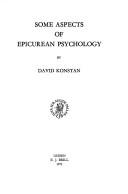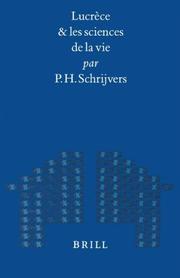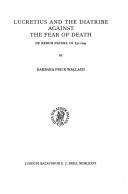| Listing 1 - 7 of 7 |
Sort by
|
Book
ISBN: 3110674688 3110674661 311065962X Year: 2020 Publisher: De Gruyter
Abstract | Keywords | Export | Availability | Bookmark
 Loading...
Loading...Choose an application
- Reference Manager
- EndNote
- RefWorks (Direct export to RefWorks)
La fine del mondo costituisce uno dei temi centrali del De rerum natura, testo che rappresenta inoltre la nostra principale fonte sull'escatologia cosmica epicurea. Mosso dall'intento d'indagare questo aspetto cruciale (che non è mai stato in precedenza oggetto di studi monografici), questo libro propone un commento delle principali sezioni escatologiche del poema: i finali del primo e del secondo libro, i vv. 91-415 del quinto e la rassegna dei fenomeni meteorologici più violenti nel sesto. L'analisi delle fonti filosofiche e degli obbiettivi polemici permette di dare risposte alla questione del "fondamentalismo" di Lucrezio, ponendo inoltre le basi per un esame del suo peculiare "sublime apocalittico". Le appendici forniscono ulteriori considerazioni sull'immaginario escatologico lucreziano, concentrandosi sul modello offerto da Empedocle, le strategie comunicative del poeta e la possibile influenza del trattato pseudo-aristotelico De mundo. Questo esame mostra che il poeta richiama dottrine e fonti filosofiche successive a Epicuro, senza però cadere nell'eclettismo: uomo del suo tempo, Lucrezio "attualizza" le dottrine del maestro, proponendole come risposta per le angosce della propria epoca.
Literary studies: classical, early & medieval --- Western philosophy: Ancient, to c 500 --- Epicureanism. --- Eschatology. --- Lucretius. --- Sublime. --- Lucretius Carus, Titus. --- De rerum natura (Lucretius Carus, Titus) --- T. Lucreti Cari De rerum natura libri sex (Lucretius Carus, Titus) --- Titi Lucretii Cari poetae ac philosophi vetustiss. De rerum natura libri sex (Lucretius Carus, Titus) --- Titi Lucretij Cari poetae ac philosophi uetustiss. De rerum natura libri sex (Lucretius Carus, Titus) --- Titi Lucretii Cari De rerum natura libri sex (Lucretius Carus, Titus)
Book
ISBN: 1474434681 147443469X 9781474434683 1474434673 9781474434676 9781474434669 1474434665 Year: 2018 Publisher: [Edinburgh]
Abstract | Keywords | Export | Availability | Bookmark
 Loading...
Loading...Choose an application
- Reference Manager
- EndNote
- RefWorks (Direct export to RefWorks)
Thomas Nail argues convincingly and systematically that Lucretius was not an atomist, but a thinker of kinetic flux. In doing so, he completely overthrows the interpretive foundations of modern scientific materialism, whose philosophical origins lie in the atomic reading of Lucretius' immensely influential book De Rerum Natura. This means that Lucretius was not the revolutionary harbinger of modern science as Greenblatt and others have argued; he was its greatest victim. Nail re-reads De Rerum Natura to offer us a new Lucretius--a Lucretius for today. The most original and shocking interpretation of Lucretius in the last 40 yearsThomas Nail argues convincingly and systematically that Lucretius was not an atomist, but a thinker of kinetic flux. In doing so, he completely overthrows the interpretive foundations of modern scientific materialism, whose philosophical origins lie in the atomic reading of Lucretius' immensely influential book 'De Rerum Natura'.This means that Lucretius was not the revolutionary harbinger of modern science as Greenblatt and others have argued; he was its greatest victim. Nail re-reads 'De Rerum Natura' to offer us a new Lucretius a Lucretius for today.Key FeaturesA new materialist, quantum and feminist interpretation of LucretiusArgues the original and provocative thesis that Lucretius was not an atomist but rather the first philosopher of motionThe most profound revision of how we read Lucretius since Michel Serres' 'The Birth of Physics' (1977)
Lucretius Carus, Titus. --- De rerum natura (Lucretius Carus, Titus) --- T. Lucreti Cari De rerum natura libri sex (Lucretius Carus, Titus) --- Titi Lucretii Cari poetae ac philosophi vetustiss. De rerum natura libri sex (Lucretius Carus, Titus) --- Titi Lucretij Cari poetae ac philosophi uetustiss. De rerum natura libri sex (Lucretius Carus, Titus) --- Titi Lucretii Cari De rerum natura libri sex (Lucretius Carus, Titus) --- HISTORY / Ancient / Rome. --- Ontologie. --- Lucretius Carus, Titus,
Book
ISBN: 1282008307 9786612008306 1442673605 9781442673601 9780802008220 0802008224 1442612991 Year: 1997 Publisher: Toronto University of Toronto press
Abstract | Keywords | Export | Availability | Bookmark
 Loading...
Loading...Choose an application
- Reference Manager
- EndNote
- RefWorks (Direct export to RefWorks)
Dalzell presents three of the major didactic poems in the classical canon: the De rerum natura of Lucretius, the Georgics of Virgil, and the Ars amatoria of Ovid, considering what tools are available for their understanding.
Didactic poetry, Latin --- History and criticism. --- Lucretius Carus, Titus. --- Virgil. --- Ovid, --- History and criticism --- Rome --- In literature. --- Pastoral poetry --- Georgica (Virgil) --- De rerum natura (Lucretius Carus, Titus) --- Ars amatoria (Ovid) --- Ars amandi (Ovid) --- Art d'aimer (Ovid) --- Liebeskunst (Ovid) --- T. Lucreti Cari De rerum natura libri sex (Lucretius Carus, Titus) --- Titi Lucretii Cari poetae ac philosophi vetustiss. De rerum natura libri sex (Lucretius Carus, Titus) --- Titi Lucretij Cari poetae ac philosophi uetustiss. De rerum natura libri sex (Lucretius Carus, Titus) --- Titi Lucretii Cari De rerum natura libri sex (Lucretius Carus, Titus) --- Georgics (Virgil)

ISBN: 9004036539 9004320466 9789004036536 Year: 1973 Volume: v. 25 Publisher: Leiden, Netherlands : E. J. Brill,
Abstract | Keywords | Export | Availability | Bookmark
 Loading...
Loading...Choose an application
- Reference Manager
- EndNote
- RefWorks (Direct export to RefWorks)
Emotions --- Human behavior --- Comportement humain --- Epicurus --- Lucretius Carus, Titus --- Action, Human --- Behavior, Human --- Ethology --- Human action --- Human beings --- Human biology --- Physical anthropology --- Psychology --- Social sciences --- Psychology, Comparative --- Feelings --- Human emotions --- Passions --- Affect (Psychology) --- Affective neuroscience --- Apathy --- Pathognomy --- Behavior --- Lukrecjusz Karus, Tytus --- Lukret︠s︡iĭ Kar, Tit --- Lucrezio, Tito --- Lucrèce --- Lucrez --- Lucrecio Caro, T. --- Caro, T. Lucrecio --- Carus, Titus Lucretius --- Lucretius --- Lucrezio Caro, Tito --- Lucrecio --- Lucreti Cari, T. --- Lucreci --- לוקרציוס קרוס, טיטוס --- Epikuros --- Ėpikur --- Epiḳoros --- Epicuro --- Epikouros --- Abīqūr --- Yibijiulu --- Epicure --- Epʻikʻurosŭ --- Έπίκουρος --- Emotions. --- Human behavior. --- Lucretius Carus, Titus. --- Epicurus. --- Lucrèce --- Lukrez --- Ἐπίκουρος --- Epʻikʻuros --- De rerum natura (Lucretius Carus, Titus) --- T. Lucreti Cari De rerum natura libri sex (Lucretius Carus, Titus) --- Titi Lucretii Cari poetae ac philosophi vetustiss. De rerum natura libri sex (Lucretius Carus, Titus) --- Titi Lucretij Cari poetae ac philosophi uetustiss. De rerum natura libri sex (Lucretius Carus, Titus) --- Titi Lucretii Cari De rerum natura libri sex (Lucretius Carus, Titus) --- Lucretius Carus, Titus - De rerum natura

ISBN: 9004102302 9004351442 9789004102309 Year: 1999 Volume: 186 Publisher: Leiden ; Boston : Brill,
Abstract | Keywords | Export | Availability | Bookmark
 Loading...
Loading...Choose an application
- Reference Manager
- EndNote
- RefWorks (Direct export to RefWorks)
This volume contains a collection of 11 studies on the philosophical and scientific background of Lucretius' De rerum natura . The studies 1-7 form a running commentary on the history of ideas in Drn . 5.780-1160 (Lucretius' famous description of the History of Human Mankind); 8-10 discuss some topics from book 4 (sleep, dreams, optical illusions) in relationship to other philosophical doctrines and ancient medical thought; the last study (11) treats the use of analogy by Lucretius.
Philosophie ancienne dans la littérature --- Philosophy, Ancient, in literature. --- -Philosophy, Ancient, in literature --- Latin didactic poetry --- Lukrecjusz Karus, Tytus --- Lucrèce --- Didactic poetry, Latin --- Philosophy, Ancient, in literature --- History and criticism --- Lucretius Carus, Titus. --- History and criticism. --- Biology --- Poésie didactique latine --- Philosophie ancienne dans la littérature --- Biologie --- History --- Histoire et critique --- Histoire --- Didactic poetry, Latin. --- Latin poetry --- De rerum natura (Lucretius Carus, Titus) --- T. Lucreti Cari De rerum natura libri sex (Lucretius Carus, Titus) --- Titi Lucretii Cari poetae ac philosophi vetustiss. De rerum natura libri sex (Lucretius Carus, Titus) --- Titi Lucretij Cari poetae ac philosophi uetustiss. De rerum natura libri sex (Lucretius Carus, Titus) --- Titi Lucretii Cari De rerum natura libri sex (Lucretius Carus, Titus)

ISBN: 9004076190 9004328254 9789004076198 Year: 1985 Volume: 90 Publisher: Leiden Brill
Abstract | Keywords | Export | Availability | Bookmark
 Loading...
Loading...Choose an application
- Reference Manager
- EndNote
- RefWorks (Direct export to RefWorks)
The crisis Rome experienced in the last decades of the Republic was intellectual as well as political, social and military. This crisis was marked by conflicts over values and a growing dichotomy between words and things, as a result of which the key words of the Roman tradition lost their anchor in the inherited, commonly-held percepetion of reality known as the mos maiorum . The crisis was therefore also one of the Latin language itself. The monograph explores this thesis in discussions of the background and character of Roman intellectual history, the nature of the mos maiorum , the relationship of the Late Republic to the Mediterranean world, the roles of Julius Caesar, Catullus, Cicero, and Lucretius in the crisis, and its Augustan and later consequences. The major portion of the discussion is devoted to Lucretius, because the De Rerum Natura is the clearest example of the extent and nature of the crisis, from which it took its origin and gained its form and purpose. A principal goal of the essay is to relate Lucretius to the structure of Roman literary and intellectual history. It finds the explanation for his work in the nature of that history and the characteristic Roman modes and categories of thought rather than in the general history fo Greek philosophy. It also offers a new explanation of the relationshiop of the authors of the Late Republic to each other. In so doing, it indicates the foundation for a new history of Roman literature and a new conception of the reality and importance of the intellectual history of Rome.
Classical Latin literature --- History of civilization --- Lucretius Carus, Titus --- Rome --- Philosophy, Ancient --- Political science --- Social values --- Philosophie ancienne --- Science politique --- Valeurs sociales --- Lucrèce, --- Didactic poetry, Latin --- History and criticism --- Intellectual life --- -Latin didactic poetry --- Latin poetry --- Lukrecjusz Karus, Tytus --- Lukret︠s︡iĭ Kar, Tit --- Lucrezio, Tito --- Lucrèce --- Lucrez --- Lucrecio Caro, T. --- Caro, T. Lucrecio --- Carus, Titus Lucretius --- Lucretius --- Lucrezio Caro, Tito --- Lucrecio --- Lucreti Cari, T. --- Lucreci --- לוקרציוס קרוס, טיטוס --- Intellectual life. --- History and criticism. --- Lucretius Carus, Titus. --- -History and criticism --- Lucrèce --- Lukrez --- History --- Latin literature --- Republic, 265-30 B.C. --- Civilization --- Moral conditions --- Rim --- Roman Empire --- Roman Republic (510-30 B.C.) --- Romi (Empire) --- Byzantine Empire --- Rome (Italy) --- Didactic poetry, Latin. --- Cultural life --- Culture --- Latin didactic poetry --- De rerum natura (Lucretius Carus, Titus) --- T. Lucreti Cari De rerum natura libri sex (Lucretius Carus, Titus) --- Titi Lucretii Cari poetae ac philosophi vetustiss. De rerum natura libri sex (Lucretius Carus, Titus) --- Titi Lucretij Cari poetae ac philosophi uetustiss. De rerum natura libri sex (Lucretius Carus, Titus) --- Titi Lucretii Cari De rerum natura libri sex (Lucretius Carus, Titus) --- Rome (Empire) --- Roman Republic --- Italy --- Didactic poetry, Latin - History and criticism --- Lucretius Carus, Titus - De rerum natura --- Lucrèce, 98-55 av JC --- Rome - Intellectual life

ISBN: 9004045643 9004327495 9789004045644 9789004327498 Year: 1976 Volume: 40 Publisher: Lugduni Batavorum : Brill,
Abstract | Keywords | Export | Availability | Bookmark
 Loading...
Loading...Choose an application
- Reference Manager
- EndNote
- RefWorks (Direct export to RefWorks)
Didactic poetry, Latin --- Philosophy, Ancient, in literature. --- Death in literature. --- Fear in literature. --- Poésie didactique latine --- Philosophie ancienne dans la littérature --- Mort dans la littérature --- Peur dans la littérature --- History and criticism. --- Histoire et critique --- Lucretius Carus, Titus. --- Peur --- --Mort --- --Lucrèce, --- De rerum natura --- --Didactic poetry, Latin --- Philosophy, Ancient, in literature --- Death in literature --- Fear in literature --- History and criticism --- Lucretius Carus, Titus --- -Fear in literature --- #GROL:SEMI-1-05'-00' --- Latin didactic poetry --- Latin poetry --- Lukrecjusz Karus, Tytus --- Lukret︠s︡iĭ Kar, Tit --- Lucrezio, Tito --- Lucrèce --- Lucrez --- Lucrecio Caro, T. --- Caro, T. Lucrecio --- Carus, Titus Lucretius --- Lucretius --- Lucrezio Caro, Tito --- Lucrecio --- Lucreti Cari, T. --- Lucreci --- לוקרציוס קרוס, טיטוס --- Lucrèce --- Lukrez --- Poésie didactique latine --- Philosophie ancienne dans la littérature --- Mort dans la littérature --- Peur dans la littérature --- Didactic poetry, Latin. --- De rerum natura (Lucretius Carus, Titus) --- T. Lucreti Cari De rerum natura libri sex (Lucretius Carus, Titus) --- Titi Lucretii Cari poetae ac philosophi vetustiss. De rerum natura libri sex (Lucretius Carus, Titus) --- Titi Lucretij Cari poetae ac philosophi uetustiss. De rerum natura libri sex (Lucretius Carus, Titus) --- Titi Lucretii Cari De rerum natura libri sex (Lucretius Carus, Titus) --- Mort --- Didactic poetry, Latin - History and criticism --- Lucretius Carus, Titus - De rerum natura Liber 3 --- Lucrèce, 98-55 av JC
| Listing 1 - 7 of 7 |
Sort by
|

 Search
Search Feedback
Feedback About
About Help
Help News
News